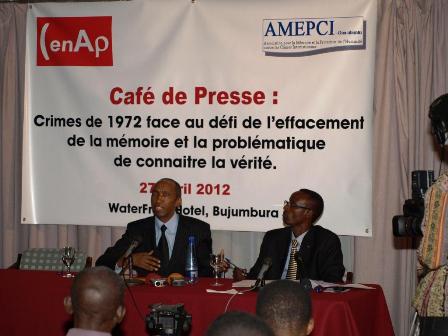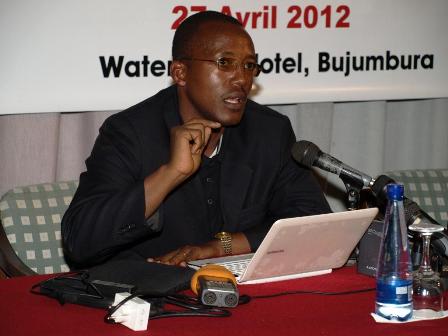Burundi: Disappearing memories

In 1972 several thousand Burundians were victim to widespread violence, among them the last King of Burundi Ntare V. Interpeace and its local partner the Centre of Alert and Conflict Prevention (CENAP), joined by the Association pour la mémoire et la protection de l’humanité contre les crimes internationaux (AMEPCI), organized a press event to mark the commemoration of the 40th anniversary of the 1972 massacres.
CENAP remembers historic moment
This event, which took place this past Friday, 27 April 2012, was meant to recognize and perpetuate the memory of thousands of Burundians who were massacred. The theme stressed how such crimes committed in 1972 face the present challenge of being erased from memory and yet, simultaneously, the problem of knowing the truth. In the past, different massacres used to be commemorated separately by the Hutu and Tutsi communities. CENAP, however, has been organizing joint community events over the past year that aim to bring Hutus and Tutsis together across ethnic divides in order to mourn the victims.
Keeping memories alive
This day was particularly significant for a nation whose history is largely neglected and forgotten due to minimal physical evidence or written documentation of the tragedy that ensued. Instead, the population has had to rely on testimonies, but these are diminishing in numbers. While some witnesses have passed away, others continue to bear the silence. In an effort to respond to such concerns the Burundian government decided to establish a truth and reconciliation commission. This event also addressed questions concerning the set up of this commission.
Present at this occasion were about 60 local and international participants ranging from journalists, representatives of victims associations, civil society organizations, political parties, public institutions, as well as witnesses.
Experts help to facilitate dialogue
Two experts Salathiel Muntunutwe and Merius Rusumo provided their insights. In order to preserve these disappearing memories, Muntunutwe, a political scientist specializing in political violence, suggested that there be a greater effort to reconstruct records of what happened. He also highlighted the dual need to protect living witnesses, and to organize proper burial ceremonies for the dead.
 Merius Rusumo, a transitional justice expert, speaks to the crowd. Photo credit: CENAP |
Merius Rusumo, an expert in transitional justice, pointed out the destruction of mass graves as a result of construction projects, stressing that: “We must act quickly if we want to know the truth and if we want to conserve the mass graves.”
One woman spoke out and said: “…the wound is always the same, fresh”. Such pain expressed speaks volume to the significance of commemoration and historical understanding.
Continued partnership with the local population and working to uncover the truth is therefore imperative in order to keep these memories alive. Charles Ndayiziga, Director of CENAP, explains: “Failure to do so will forever stand as an obstacle to understanding the country’s past, and acts as a hindrance to longstanding peace and reconciliation.”
